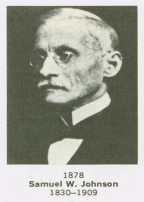ACS President: Samuel W. Johnson (1830-1909)
Served as President: 1878
Published first scientific paper at age 17
Pioneer in establishing agricultural experimental stations in United States
Education:
- Attended Yale University
- Studied in Germany with Otto Linne Erdmann, University of Leipzig, inorganic analysis, 1853
- Studied with Justus von Liebig, University of Munich, organic analysis, 1854
Career Highlights:
- Professor of theoretical, agricultural and analytical chemistry, Yale University, 1856-96
- Founding director, Connecticut Agricultural Experiment Station, first in USA, 1877-1900
- Specialized in agricultural chemistry
Notable Accomplishments:
Writer of lectures and articles on emerging technical topics, e.g., peat, fertilizers, ammonia fixation, plant nutrition, soils, crop rotation, food adulteration, methods of analysis. Author of two textbooks, How Crops Grow, 1868 and How Crops Feed, 1870. Showed great skill in inventing and improving apparatus, especially that used in nitrogen determination of fertilizers by the Kjeldahl procedure and that in ether extraction. Developed the fundamental principles of policy for agricultural stations and encouraged relationships with farmers and the public. Was an excellent and influential writer of daily and weekly articles on agricultural themes for interested members of the public.
Major Awards and Honors:
- Elected member, National Academy of Sciences, 1866
- Associate Fellow, American Academy of Arts and Sciences
- Honorary Master’s degree from Yale University, 1856
Service to Science:
- President, Association of Official Agricultural Chemists, 1885
- President, American Association of Agricultural Colleges and Experimental Stations, 1896
Did You Know
. . . that Johnson was recognized as the outstanding American agricultural chemist in the last half of the 1800’s?
. . . that Johnson served as an expert witness in cases involving chemical analysis?


